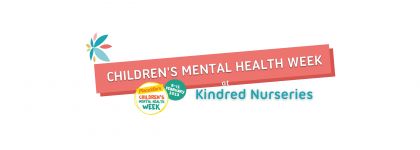
Blog
Nurturing Positive Mental Health and Wellbeing in Our Children
At Kindred Nurseries, we pride ourselves on being trailblazers in the ‘World of Well-being’. This week (6th – 12th February) is Children’s Mental Health week, so we wanted to let you know about some of the ways that we put the Mental Health and well-being of our children, their families and our staff at the forefront of everything we do, with particular focus on the effects of the global COVID-19 pandemic.
PANCo
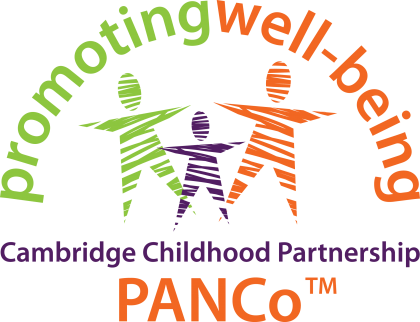
In 2020, we invested in training our staff across our family to become Level 4 qualified Physical Activity and Nutrition Coordinators (PANco). PANco is a specialist role which acts as a beacon for quality provision in the Early Years and has been designed as a wellbeing-in-action intervention that promotes positive nutrition and physical activity. It links closely to local and national strategies, including the obesity strategy. We are exceptionally proud to say that you will find a qualified PANco at every one of our nurseries.
Mental Health First Aiders
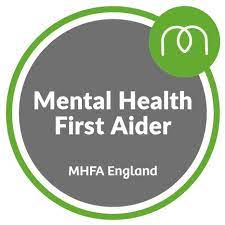
Many of our staff have undertaken the internationally recognised Mental Health First Aid course. This qualification has helped us develop a deep understanding of well-being and mental health, and has allowed us to put in place an exceptional well-being approach that continues to help our children, their families and our teams to thrive by providing first-level support and early intervention.
Kindred Satchel - Family App
Our Satchel app– rolled out as the lockdown hit in 2020— was introduced for parents to be involved and engaged in real-time when they were unable to be there in person. Having an electronic way of communicating with one another allows our Kindred parents to feel part of their child’s journey, letting them see the magic as it unfolds throughout the day.
During the pandemic, our staff were the biggest form of normality for children at a time when things felt far from normal. Sharing this sense of normality with parents and carers through videos, pictures and individual feedback allowed our staff to still be able to speak to parents directly, creating a personal feel when it wasn’t possible to actually be there in person. It also acted as a way of bridging the gap for higher-risk families, where the app was used to post things like activity sheets and Kindred Story Time videos to include and engage children who couldn’t come in.
The Kindred Satchel app still remains an integral part of our partnership with families, not only for day-to-day communication, but also as a way to alleviate anxiety after first-time drop-offs, or returning after sickness, to aid in concerns and to celebrate milestones, though most importantly to simply connect.
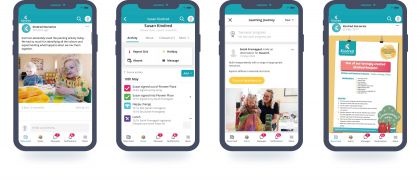
Just Add One
A report published by the First 1001 Days Movement has highlighted how children born in the pandemic continue to have delayed speech, language and social skills. The report, based on a survey of over 500 professionals and volunteers in the Early Years, Maternity and Heath Visiting sectors alongside existing data and research, found that 92 per cent of people asked believe the pandemic has had a negative impact on children’s communication, speech and language skills, emotional well-being, and development.
At Kindred, we recognise that Speech, language and communication skills are crucial to young children's overall development. Being able to speak clearly and process speech sounds, to understand others, to express ideas and interact with others are all fundamental building blocks.
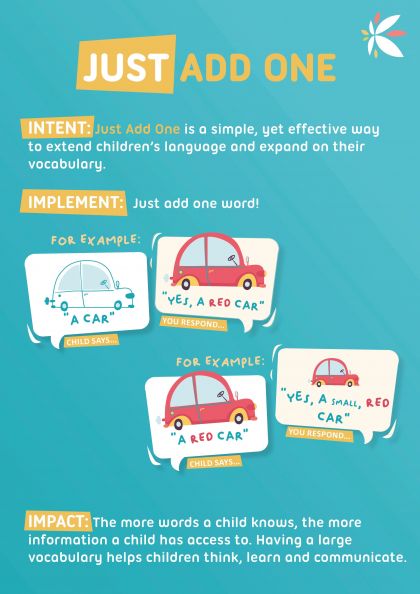
One of the many practices we deliver and promote in order to continuously develop children’s speech, language and communication skills is ‘Just add one’— a simpler way to understand the term 'scaffolding language'— introducing new and interesting words and extending children's vocabulary. In turn, this also enhances their ability to connect and communicate with their peers and adults.
*You can read the full First 1001 Days Movement report here.
